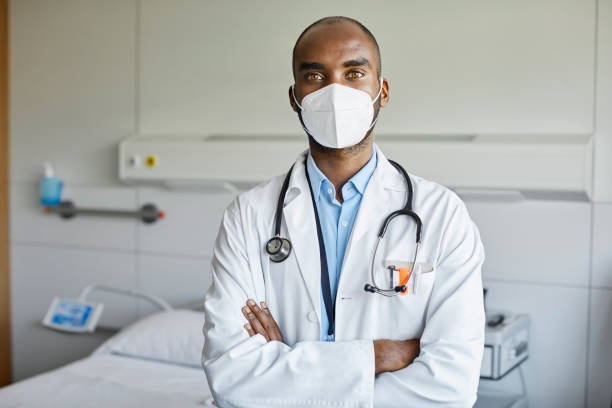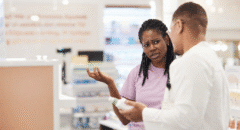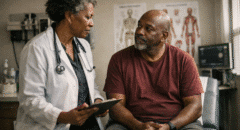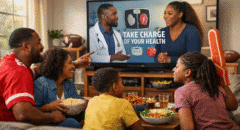1. When Should I Get Tested
The most obvious time to get tested for COVID-19 is when you have noticeable symptoms.
The Symptoms of COVID are: (note that many resemble conditions such as seasonal allergies, the common cold and the flu…that’s one reason we strongly suggest getting the flu shot immediately!)
- A cough
- Sore throat
- Minor congestion
- Low-grade fever
- Headache
- Fatigue
- Loss of taste or smell (mainly associated with the Delta variant)
If you were exposed to someone who has COVID-19, you should get tested whether or not you have symptoms yourself.
- This test should be done 5 days after exposure.
- CDC definition of exposure or close contact is being within 6 feet (2 meters) for a total of 15 minutes or more, over a 24-hour period.
Get tested between three and five days after traveling internationally regardless of your symptoms.
- If you're traveling domestically
- Fully vaccinated people should get tested only if they develop symptoms
- Unvaccinated people should get tested three to five days after returning
- Before attending gatherings:
- You should use home tests or PCR tests before attending gatherings with people that you don't live with, especially if you don't know everyone's vaccination or booster status
2. When is Someone With COVID Contagious?
A person with COVID-19 is considered infectious starting two days before they develop symptoms, or two days before the date of their positive test if they do not have symptoms
- The original variants had an incubation period of four to five days but with omicron, it’s two to three days
3. What Are The Different Tests
Currently, there are two types of diagnostic tests:
- Molecular (RT-PCR) tests that detect the virus's genetic material
- These require testing by a laboratory service
- Often requires 1-3 days to get results
- This is the most accurate test option for determining the presence of a virus
- The PCR test is not a test that we use after a Covid infection because it is so sensitive that it can identify traces of the virus many weeks after a person is no longer infectious and can stay positive for weeks to months
- Antigen tests that detect specific proteins on the surface of the virus
- These are the “home tests” that provide results immediately
- While not as accurate as the PCR for initial diagnosis but, they have a very useful place in our COVID arsenal
- Samples are typically collected with a nasal or throat swab, or saliva collected by spitting into a tube.
- Results available in 15 minutes
- Most accurate if you have symptoms of COVID…sometimes the test can read negative at first but becomes positive as the exposure progresses.. so feel free to retest as that’s why the kit contains two tests
- Please get a PCR test to confirm the results
- Antibody tests are also available for some special purposes
- They look for antibodies that are made by the immune system in response to a threat, such as a specific virus
- Antibodies can take several days or weeks to develop after you have an infection and may stay in your blood for several weeks after recovery.
4. Quarantine and Isolation: What Do I Need To Know?
What Is the difference between the two?
- Quarantine separates and restricts the movement of people who were exposed to a contagious disease to see if they become sick
- Isolation separates infected and sick people with a contagious disease from people who are not sick
How do I separate myself from others whether I am quarantining or isolating?
- Health officials recommend a "sick room" or area for those who are infected and a separate bathroom, if possible
- That means you should stay in a separate room and use a separate bathroom from other people in your household, if possible, the CDC says
- You should also wear a mask if you have to be around other people
- Avoid sharing items (like cups and towels)
- Avoid public transportation and generally avoid contact with other people
- Monitor yourself for symptoms. You will likely get specific instructions from your doctor's office about what to watch for, which might include things like taking your temperature every day
5. What should you do if you or someone with whom you have been in close contact tests positive for coronavirus during the holidays?
If I am Fully Vaccinated AND HAVE RECEIVED MY BOOSTER and am Asymptomatic:
- If you have received your booster shot, you do not need to quarantine after an exposure, but should wear a mask for 10 days following the exposure and get tested at day 5
- If you are traveling home after a holiday visit, and are vaccinated and asymptomatic: you can do so by car with other vaccinated and asymptomatic people or by commercial transportation as long as you follow the masking requirements
- The BCAC recommends wearing your masks at all times when going outside your home and when in contact with people whose vaccine status you don’t know
- If symptoms do occur you should immediately quarantine, until a negative test confirms that the symptoms are not due to COVID-19
If I am Fully Vaccinated (Within The Last Six Months) But Without the Booster and Asymptomatic:
- You do not need to quarantine after an exposure, but should wear a mask for 10 days following the exposure and get tested at day 5
- The BCAC recommends wearing your masks at all times when going outside your home and when in contact with people whose vaccine status you don’t know
If I am Fully Vaccinated (But More Than Six Months Ago for Moderna or Pfizer and Two Months Ago For J&J) And Still Without the Booster and Asymptomatic:
- Quarantine by staying home for 5 days
- After that continue to wear a mask around others for 5 additional days
- If you can’t quarantine you must wear a mask for 10 days
- Test on day 5
- The BCAC recommends wearing your masks at all times when going outside your home and when in contact with people whose vaccine status you don’t know
If I am Not Vaccinated and Asymptomatic:
- Quarantine by staying home for 5 days
- After that continue to wear a mask around others for 5 additional days
- If you can’t quarantine you must wear a mask for 10 days
- Test on day 5
- The BCAC recommends wearing your masks at all times when going outside your home and when in contact with people whose vaccine status you don’t know
6. What should you do if you test positive?
Everyone, regardless of vaccination status:
- Isolate by staying home for 5 days
- Assume that you’re infected and can spread the virus to others: it takes time for symptoms and tests to emerge as positive…you still can spread the virus to others before you feel ill or test positive
- If you have no symptoms or your symptoms are resolving after 5 days, you can leave your house
- Continue to wear a mask around others for 5 additional days
- The BCAC respects the CDC’s guidance but take a more cautious approach regarding continual mask wearing when around other people
- If you have a fever, continue to stay home until your fever resolves
- Don’t forget to tell your close contacts that you tested positive and they may have been exposed
7. What To Do If Symptoms Develop?
COVID symptoms can appear anywhere from two to 14 days after someone is exposed to the virus
- Anyone with symptoms should get tested for COVID immediately and contact their healthcare provider
- You should immediately quarantine until a negative test confirms that the symptoms are not due to COVID-19
- If you're having severe symptoms:
- Call your doctor's office and get their advice because:
-
-
- There are of course other things like the flu that are out there that can mimic COVID symptoms
- They may recommend that you receive Monoclonal Antibodies (see below)
-
- If you're having mild or lingering symptoms and your at home test was negative:
- Retest in three to five days…that’s why most of these kits actually come with two tests
8. When Should You Call a Doctor?
When you have tested positive and have symptoms. The CDC urges those who have or may have COVID-19 to watch for emergency warning signs and seek medical care immediately if they experience symptoms including:
- Trouble breathing
- Persistent pain or pressure in the chest
- New confusion
- Inability to wake or stay awake
- Pale, gray, or blue-colored skin, lips, or nail beds, depending on skin tone
9. What Do I Do If My Child Under 5 Is Exposed To A COVID Positive Person
They do not need to see the doctor if there are no COVID symptoms
- Your child should quarantine at home for 14 days and watch for symptoms
They do need to get a COVID-19 test. If needed, the CDC says that you can shorten your child's quarantine to 10 days as long as your child shows no symptoms, or to 7 days if your child has a negative COVID-19 test on or after day 5
10. What About Monoclonal Antibodies?
Monoclonal antibodies are laboratory-produced molecules that act as substitute antibodies that can restore, enhance or mimic the immune system's attack on cells
For COVID, Monoclonal Antibody treatment is available to individuals with serious disease but they must be administered within five days of when you first started developing symptoms.
- Test positive for COVID-19 (PCR or antigen test), AND:
- Have had mild-moderate symptoms for 7 days or less (must still be symptomatic), AND:
- Age ≥ 65 years OR
- Age 12 years and older weighing at least 40 kg
- Have at least one of the following:
- Overweight as defined by BMI > 25 kg/m2, or if age 12-17, have BMI ≥ 85th percentile for their age and gender based on CDC growth charts
- Pregnancy
- Chronic kidney disease
- Cardiovascular disease (including congenital heart disease, hypertension)
- Diabetes
- Down syndrome
- Dementia
- Liver disease
- Current or former smoker
- Current or history of substance abuse
- Immunosuppressive disease or immunosuppressive treatment
- History of stroke or cerebrovascular disease
- Chronic lung disease
- Sickle cell disease
- Neurodevelopmental disorders (e.g., cerebral palsy)
- Having a medical-related technological dependence (e.g., tracheostomy, gastrostomy)
- Post-exposure preventive monoclonal antibodies are available to those who have been exposed consistently with the CDC's close contact criteria AND who are:
- High risk for developing severe COVID-19 AND
- Not fully vaccinated OR vaccinated but immunocompromised AND
- 12 years of age or older (and at least 88 pounds)










